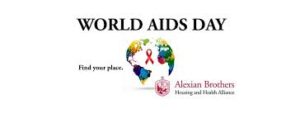Another World AIDS Day - Part 2
 Tuesday night I was honored to be on the program for the Alexian Brothers Housing and Health Alliance World AIDS Day event here in Chicago. About twenty people took to the stage to recite poetry, sing, play guitar or piano, tell stories. The mistress of ceremonies was a drag queen. It all felt very familiar and comforting.
Tuesday night I was honored to be on the program for the Alexian Brothers Housing and Health Alliance World AIDS Day event here in Chicago. About twenty people took to the stage to recite poetry, sing, play guitar or piano, tell stories. The mistress of ceremonies was a drag queen. It all felt very familiar and comforting.Almost thirty years ago, Bonaventure House, their housing program for people with HIV/AIDS, was one of my clients. I wrote government and foundation grants for them. So when I found out they were hosting this event, I wanted to be part of it.
It was also the first time I’ve spoken in front of an audience since my mother’s graveside service in March. I wasn’t nervous: I have a master’s degree in theatre, so being onstage is old hat. But I was very focused on what I wanted to talk about and why.
My blog post last week reflected on the first World AIDS Day in 1988 and urged long-term survivors - whether they are HIV-positive or HIV-negative - to share their stories. I decided to use that idea in my speech.
I said I wasn’t nervous, which means I wasn’t shaking. But I did feel that old tingling about five minutes before I walked up on stage. That was familiar and comforting, too.
This is part of what I said. It’s something I think about almost every day, not just once a year on December 1. And whether you’re touched by the AIDS epidemic or not, I hope it’s something you’ll keep in mind, too.
Telling stories - face to face, in a blog post, a video, or in a Facebook group - is a powerful way to end the epidemic. Whether it’s the heartbreaking AIDS Memorial site on Instagram or the ACT UP Oral History Project, when you share your story, and really tell it, not gloss over the bad parts, you help others realize that they are not alone. You let them know that together you now share the responsibility of carrying on the work to end the epidemic, the work started years ago by those who knew they wouldn’t live to see this day, but fought anyway.
The ACT UP slogan made famous thirty years ago - Silence=Death - is still true today. We speak up for ourselves and those who cannot, because every day we see the tragic consequences of being silent. But it’s also true that silence doesn’t only equal physical death. It equals stigma and fear and loneliness and pain.
I’m often amazed by how little it takes to get people to talk about the epidemic. I was having lunch at a writing conference in Boston last year, sitting with a group of writers. We went around the table and shared what we were working on, and I explained my book about straight women in the AIDS community.
A man sitting directly across the table glared at me. For a moment, I thought, “oh, great, he’s going to start in about God’s punishment or something.” I could not have been more wrong.
“My best friend was on the meds,” he began softly, with a barely controlled anger. “He’d had it for a long time, but he was fine. And then he just stopped taking them and he died. And I don’t understand why.”
It was not the only time someone has told me a story like that, but it certainly took us all by surprise.
“I know,” I began, and explained the concept of moral injury, which in its most basic form is survivor guilt. I talked about Spencer Cox, one of the stalwarts of ACT UP/NY who isolated himself physically and emotionally from those around him. As everyone else at the table listened, he and I talked about the need to reach out, especially to long-term survivors, and keep them engaged. And I assured him, his friend’s death was not his fault. Because that’s really why he told me his story.
I’m not a therapist. I have a master’s degree in theatre and many years of fundraising experience. But you don’t need academic credentials to listen to people’s stories. You don’t need them to share your stories, either. You only need the willingness to open yourself to the possibility of healing.
So I guess what all this means to me, and what I hope it means to you, is that telling your story is not just reciting names and facts. It’s not nostalgia, an accusation leveled at many of us who talk about the early days of the epidemic. It’s coming to terms with what you’ve survived, and daring to answer ‘why’. It’s accepting that you are part of a larger community and the world beyond it, where there are people who need to hear your story.
In September of 2015, I attended the US Conference on AIDS in Washington, my first big AIDS conference in many years. If you’ve been to big conferences, you know that by the final day, your brain is pretty mushy. I sat there during the gospel brunch that ended the conference, listening to the ministers offer their invocations when one said something that snapped me out of that fog:
“Sometimes you choose your calling and sometimes your calling chooses you.” If that doesn’t describe the AIDS community, I don’t know what does.
Remember: your stories are a part of you. And they deserve to be told.

